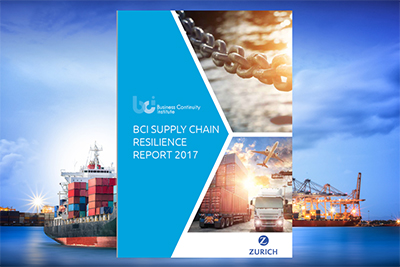Almost three-quarters of organizations have reported having business continuity arrangements related to supply chain management. That is according to a report recently published by the Business Continuity Institute and supported by Zurich Insurance Group.
The report showed that organizations with business continuity arrangements are eight times more likely to report greater supply chain visibility, twice more likely to insure for supply chain losses, and three times more likely to display top management commitment.
74% of organizations ask their key suppliers about their business continuity arrangements; a considerable increase from last year's 63%. This behaviour coincides with other areas of good practice, especially organization-wide reporting of disruption, which increases supply chain visibility.
Another important result outlined by the report is the use of technology and big data to overcome skills and resources gaps in supply chain management. The report shows that 63% of organizations do not use any technology to analyse, track, and monitor the performance of their supply chains.
Technology is not the only low uptake by organizations. The report highlights an increase in availability of insurance products against supply chain losses in the market. However, it showed that 51% organizations still do not insure against supply chain disruption at all.
The report concludes by underlining two other important aspects in supply chain resilience. The first is how reputation is still an important aspect in supply chain disruption, which requires organizations to become more aware of the issues around their supply chain and communicate effectively in times of crisis. The second is the element of collaboration, which still faces challenges in being implemented, but represents a great resource for effective supply chain management.
Other findings of the report include:
- Top causes of supply chain disruption: unplanned ICT and telecommunication outage, cyber-attack and data breach, and loss of talent and/or skills. Fire is the biggest increase this year in terms of threats to supply chain, jumping from 14th last year to the 7th biggest cause of disruption this year. On the other hand, terrorist acts and currency volatility have dropped out of the top ten.
- Impacts and/or consequences of disruption: loss of productivity (55%), increased cost of working (46%), and customer complaints remain as the top three impacts of supply chain disruptions.
- Economic impacts of disruption: more respondents (53%) reported losses for less than 50,000 euros compared to last year (33%). However, losses of more than one million euros have decreased from 34% to 22%.
“Supply chain disruptions have become increasingly tough for organizations to deal with,” says Gianluca Riglietti CBCI, Research Manager at the BCI and author of the report. “The current threat landscape requires very high levels of preparedness, as it includes a wide range of threats such as cyber-attacks, terrorism, and natural disasters.'
According to Riglietti, professionals understand this, which is reflected in the higher number of respondents (74%) adopting business continuity arrangements to deal with supply chain disruptions. However, there is still room for improvement, as more than one in five (22%) do not have full visibility of their supply chains.
“On a different note, it is also interesting to observe that the majority of respondents do not use technology to analyse the performance of their supply chain, which might raise the question of how a higher uptake of modern solutions could affect performance,” adds Riblietti.
For the last nine years, the BCI Supply Chain Resilience Report in partnership with Zurich Insurance Group has provided valuable insight into supply chain disruption and benchmarked the business continuity arrangements of organizations in this area. It has also demonstrated how specific key behaviours reinforce good practice and build an organizational culture contributing to supply chain resilience and performance.
“It is encouraging to see some progress in terms of the reduction in the level of significant supply chain disruptions, but at 65 % it is still very high,” says Nick Wildgoose, Global Supply Chain Product Leader at Zurich Insurance Group. “It is important that in terms of your critical value or supply chains you understand your level of resilience and at the very minimum you are able to react quickest to a disruption event. Sometimes being second is not good enough.”
Wildgoose told SCMR in an interview that the industries that tend to invest in supply chain resilience are technology, pharmaceutical, financial services and automotive.
“I am reluctant to name whole industries that are lagging behind, because there are exceptions everywhere,” he adds. “As the BCI report clearly shows, there is plenty of opportunity to improve performance for many companies in all industries.”
SC
MR


Latest Supply Chain News
- Few executives believe their supply chains can respond quickly to disruptions
- Technology’s role in mending supply chain fragility after recent disruptions
- Tech investments bring revenue increases, survey finds
- Survey reveals strategies for addressing supply chain, logistics labor shortages
- Israel, Ukraine aid package to increase pressure on aerospace and defense supply chains
- More News
Latest Podcast

 Explore
Explore
Business Management News
- Few executives believe their supply chains can respond quickly to disruptions
- Technology’s role in mending supply chain fragility after recent disruptions
- Survey reveals strategies for addressing supply chain, logistics labor shortages
- How CPG brands can deliver on supplier diversity promises
- How S&OP provides the answer to in-demand products
- AI, virtual reality is bringing experiential learning into the modern age
- More Business Management
Latest Business Management Resources

Subscribe

Supply Chain Management Review delivers the best industry content.

Editors’ Picks





